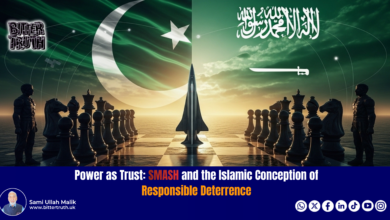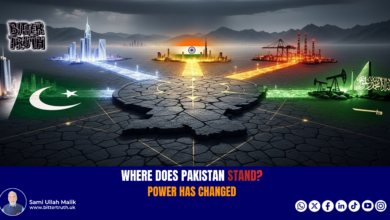The Foundation of the Pakistan
Movement and the Conspiracies of Foreigners
Studying the centuries-long history of the Indian subcontinent opens new avenues of thought and it feels as if the foundation for the creation of Pakistan was laid centuries ago. Subsequently, historical events continued to shape themselves towards this purpose. This is why some historians conclude that the creation of Pakistan was inevitable and destined by divine will. Reflecting on the significant milestones of this extensive historical journey provides clear evidence of this assertion.
Among the historical records of ancient India, the Tarikh-e-Ferishta holds a credible status. Reading a letter written by Shahabuddin Ghori, dated 1192, in response to a letter from the famous Hindu ruler Raja Prithviraj, left me in deep thought. The Muslim and Hindu armies stood face-to-face in the field of Tarain. Two years earlier, Shahabuddin Ghori had faced defeat at the hands of Prithviraj and was now preparing for a decisive battle. Prithviraj was considered the symbol of Hindu power and had the full support of Hindu rulers. Before the battle, Ghori sent a letter to Prithviraj proposing mutual peace, demanding the provinces of Punjab, Sindh, and the Frontier, as these areas had relatively higher Muslim populations who were suffering under oppressive rule.
Baluchistan was not included in this demand as it already had a Muslim government. However, Prithviraj, intoxicated with power, rejected Ghori’s peace offer and refused to cede these areas. The resulting battle led to a crushing defeat for Prithviraj and his hundreds of companions, who were participating in this holy war according to their faith. Prithviraj was killed, breaking the back of Hindu power, and Ghori appointed Qutbuddin Aibak as the ruler of the conquered territory. In 1193, Aibak captured Delhi, establishing the first regular Muslim government in India. The Battle of Tarain is considered a crucial milestone in Indian history as it decided the destiny of India and paved the way for a Muslim government.
Ghori’s letter holds extraordinary significance for us, revealing many aspects that require deep contemplation. Before delving into this topic, it’s essential to remember that the first Islamic state in India was established by Muhammad bin Qasim. His rule covered a much smaller area compared to later conquests. Muhammad bin Qasim invaded India in 712, reaching Multan before being recalled in 715. Shortly after his departure, the Muslim state weakened and fragmented into smaller states due to rebellions by local chieftains and rulers. Therefore, the credit for establishing a significant Muslim rule rightly goes to Qutbuddin Aibak.
However, the question arises: how did the Muslim population in the areas comprising present-day Pakistan become relatively higher by 1192, despite the absence of a stable Islamic government until then? Undoubtedly, Muslim invaders frequently attacked during this period, often returning with spoils of war.
From 997 to 1030, Mahmud of Ghazni launched 17 invasions into India, weakening local Hindu states and indirectly strengthening Muslims, but he never established an Islamic state in India, often returning home with looted wealth. This refutes the claim by Hindu and Western historians that Islam spread by the sword, as by the Battle of Tarain, there was neither an Islamic government in India nor sufficient Muslim power to spread Islam by force. Instead, many saints, Sufis, and pious individuals, particularly Hazrat Ali Hujwiri, known as Data Ganj Bakhsh, settled in India during this period. They accompanied Mahmud Ghazni’s army and stayed, winning the hearts of the local populations through their spiritual influence, gradually bringing them into the fold of Islam over centuries. By 1192, the Muslim population had significantly increased in the regions of present-day Sindh, Frontier, and Punjab, paving the way for the eventual creation of Pakistan.
When reflecting on the selected aspects of this issue, profound wisdom and clear signs of divine will are revealed. The noteworthy point is that while Sufi saints were spread throughout India, including notable places like Delhi, Sirhind, and Ajmer Sharif, Muslims did not achieve majority status in these regions. Another significant observation is that over time, Muslims became a majority in those provinces or areas that were geographically contiguous and connected to each other. If Muslims had been in the majority in the Frontier province alone, and also in distant regions of India such as UP, would the demand for Pakistan have been possible or acceptable? The answer is no. The demand for Pakistan was based on the premise that Punjab, Frontier, Sindh, Baluchistan, and later East Bengal—where Muslims were in the majority and geographically linked—should form an independent Muslim state where Muslims could live according to their religion, culture, and traditions. It seems to be divine will that Muslims became a majority in these regions, forming a geographic unit.
In this context, Pakistan’s foundation was essentially laid when Shahabuddin Ghori demanded these areas for peace from Prithviraj. In this backdrop, during his 1944 speech at Aligarh, Quaid-e-Azam said that Pakistan was established the day the first Muslim set foot on Indian soil. This was because Muslims represented a distinct way of life, a unique culture, and mindset, entirely different from other Indian communities. This historical statement by Quaid-e-Azam was made considering that in Hinduism, a child’s identity is derived from the father’s religion, creating a deep divide of hatred and humiliation among Hindus. However, the day the first person in India embraced Islam, he completely severed ties with his previous identity and adopted a religion that differentiated his entire way of life from Hindus.
In the history of India, I see a profound connection between Muslims and Islam. Whenever Islam faced a challenge or Muslims encountered a genuine threat, forces emerged to successfully counter these challenges and protect Muslims. Historically, Muslims ruled India for 680 years, with a total of 76 rulers. The most powerful government was considered to be that of the Mughal dynasty, during which Islam in India first faced a serious challenge in the form of Akbar’s Din-i-Ilahi. Hazrat Mujaddid Alf Sani stood as a barrier against Din-i-Ilahi and fulfilled the religious leadership role for Muslims. The Mughal dynasty, except for Aurangzeb Alamgir, is considered a liberal government, with at least two or three kings born to Hindu mothers. Hence, the Mughal dynasty’s role in serving Islam in India was limited. Islam spread internally through the blessings of saints, Sufis, and pious individuals.
Aurangzeb Alamgir passed away in 1707, and subsequently, the Mughal Empire weakened. The 18th and 19th centuries were extremely challenging for Muslims in India as Muslim governments began to fall, anti-Muslim forces took control of various regions, and Muslims felt increasingly insecure. The British, who had arrived in India during Akbar’s reign for trade purposes, gradually expanded their influence, increased their military strength, and defeated Siraj-ud-Daulah in the Battle of Plassey in 1757, capturing Bengal. They defeated Tipu Sultan in 1799, taking control of his kingdom, and after the Battle of Buxar in 1764, Mughal Emperor Shah Alam submitted to the British, marking the fall of Delhi. In 1808, Ranjit Singh established a Sikh government in Punjab, severely oppressing Muslims, even converting the royal mosque into a stable.
During this period of decline and tribulation for Muslims, Shah Waliullah initiated a social reform movement, organized programs to awaken jihad among Muslims, invited Ahmad Shah Abdali to weaken anti-Muslim forces, and wrote letters to Muslim leaders, which help us understand the psyche and thoughts of Muslims of that time. The essence of these letters was that for the survival of Muslims and Islam in India, it was essential to establish Muslim governments in certain areas. Reflecting on this, it becomes apparent that this thinking laid the foundation for the Pakistan Movement. This is precisely what Allama Iqbal repeatedly emphasized in his Allahabad address and letters to Quaid-e-Azam, and Quaid-e-Azam often echoed this sentiment. This dream of a Muslim state grew in the collective unconscious of Muslims after the end of their rule in India, eventually manifesting in the demand for Pakistan.
Shah Waliullah’s successor, Shah Abdul Aziz, declared India a Dar-ul-Harb, and Syed Ahmad Shaheed launched a jihad to liberate the Muslims of Punjab from Ranjit Singh’s oppression. In 1826, the jihadist caravans moved towards the Frontier province. The Mujahideen won the first and second encounters, capturing the Frontier, and in 1827, Syed Ahmad Shaheed was appointed the Amir-ul-Momineen of the Frontier province, declaring the enforcement of Shariah. Ranjit Singh personally came to Peshawar and succeeded in winning over some tribal leaders, notably Yar Muhammad and Sultan Muhammad. In the decisive battle of Balakot, Yar Muhammad deserted the Mujahideen during the battle and poisoned Syed Ahmad through his cooks. In 1831, at Balakot, Syed Ahmad Barelvi and Shah Ismail were martyred, thus ending the movement that Shah Waliullah had initiated in 1731, exactly a century later in 1831.
Syed Ahmad Shaheed and Shah Ismail’s Endeavour
Syed Ahmad Shaheed and Shah Ismail intended to liberate the Muslims of this region from Sikh rule and then wage jihad against the British, but their dream remained unfulfilled. It had to be realized in a different form and manner, as fate would have it. On the other hand, the British were slowly expanding their influence and employing cunning strategies to establish control over India. After defeating the armies of Siraj-ud-Daulah, Tipu Sultan, and Shah Alam, they emerged as a formidable military force. Following this strategy, the British annexed Sindh in 1843 and Punjab on March 29, 1849, thus taking control of these provinces. In 1856, the British, with the assistance of Awadh’s Prime Minister Mir Ali Naqi, compelled Awadh’s ruler Wajid Ali Shah to sign over his kingdom and then imprisoned him in Metiabruz, Calcutta.
A historian notes that three ‘Mirs’ determined the fate of Muslim rule in India. Mir Jafar betrayed Siraj-ud-Daulah at the Battle of Plassey, leading to the loss of Muslim governance in Bengal. Mir Sadiq’s betrayal resulted in Tipu Sultan’s defeat, turning Muslims in Mysore from rulers into subjects. Lastly, Mir Ali Naqi facilitated the British annexation of Awadh by securing Wajid Ali’s signature. In Punjab, the historians mention a key figure from the Fakir family in Lahore, who helped strengthen Ranjit Singh’s rule and facilitated negotiations with the Mujahideen. This influential figure, highly regarded in Ranjit Singh’s court, supposedly received the title of ‘Syed’ from the British, as per a command seen in the Punjab Secretariat’s archives by Moizuddin Ahmed, son of Maulana Salahuddin Ahmed.
After the failed War of Independence in 1857, the British firmly established their rule in India. They introduced science, technology, communication, railways, modern education, and a political culture, which fostered a sense of nationalism. This led to the emergence of political parties, discussions about voting rights, and elections, consequently nurturing a sense of limited democracy and the notion of majority and minority.
As a result, Muslims increasingly felt that, as a minority, they would perpetually remain subjugated by the majority. They began to realize that, given their distinct religion, culture, historical background, and national identity, they should strive for a separate homeland. From Sir Syed Ahmad Khan to Quaid-e-Azam, almost all Muslim leaders initially advocated for Hindu-Muslim unity. However, experiencing Hindu narrow-mindedness and attitude firsthand, they chose different paths. The significant milestone of Hindu-Muslim unity was the Lucknow Pact of 1916, which was shattered by the Nehru Report in 1928. This disillusioned even steadfast individuals like Quaid-e-Azam, leading him to declare that the paths of Hindus and Muslims were now separate. Allama Iqbal’s Allahabad Address in 1930 provided Muslims with a new perspective and awakened a sense of destiny. The Congress rule in six provinces following the 1935 elections further opened Muslim eyes, setting the stage for the Pakistan Resolution in 1940, where Muslims under the banner of the Muslim League demanded an independent and separate homeland.
Subsequently, the British government made numerous efforts to solve the “Indian problem,” as documented in various books, but all efforts and schemes eventually failed. Alongside political developments, some spiritual signs also indicated divine will. Hakim-ul-Ummah Maulana Ashraf Ali Thanvi, an interpreter of the Quran, lover of the Prophet ﷺ, and a spiritual personality, had millions of followers and devotees. Such a saintly person could only be expected to speak the truth. His nephew, Maulana Zafar Ahmad Usmani, recounts that one day Maulana Thanvi called him and said:
“I seldom dream, but today I had a strange dream. I saw a large gathering, as if it were the Day of Judgement. In it, saints, scholars, and righteous people were seated on chairs. Mr. Muhammad Ali Jinnah was also present, dressed in Arabic attire, seated on a chair. I wondered how he was included in this gathering, and I was informed that Muhammad Ali Jinnah is currently rendering great service to Islam, hence he has been accorded this status.” (Reference: “Tameer-e-Pakistan aur Ulama-e-Rabbani” by Munshi Abdul Rahman, Idara Islamiyat, Lahore, 1992, p. 92)
On 4th July 1943, Maulana Thanvi summoned Maulana Shabbir Ahmad Usmani and Maulana Zafar Ahmad Usmani and said, “The Pakistan Resolution of 1940 will be successful. My time is near. If I were to live, I would surely work for the success of this great cause. It is divine will that Muslims should have a separate homeland. Do whatever you can for the creation of Pakistan and encourage your followers to do the same. One of you two Usmanis will lead my funeral prayer, and the other will lead Jinnah’s funeral prayer.” (Reference: “Quaid-e-Azam ka Mazhab aur Aqeedah” by Munshi Abdul Rahman, p. 249)
Maulana Shabbir Ahmad Usmani led the funeral prayer of Quaid-e-Azam in Karachi. Maulana Hasrat Mohani, a revered, selfless, and brave individual, spent a significant portion of his life in jail for his resistance against British rule and often endured hard labour as punishment. His famous couplet encapsulates his struggle:
شوق سے کَٹتے ہیں رات دن زنداں میں موہانی
ہم خوش ہیں اپنی قسمت پہ کریں گے دعائیں کیا
(Translation: “Happily the days and nights pass in prison, Mohani. We are content with our fate, what prayers shall we offer?”)
اک طرفہ تماشہ ہے حسرت کی طبیعت بھی
ہے مشق سخن جاری چکی کی مشقت بھی
The nature of longing is also a one-sided spectacle
The practice is also the work of the ongoing mill
Maulana Hasrat Mohani presided over many meetings of the Muslim League and was such a domineering person that he stood up in a full meeting of the Muslim League Council and criticized the policies of the Quaid-e-Azam and the Quaid-e-Azam himself used to respect him immensely. The democratic mood is also revealed. Allah Ta’ala blessed Mu La Na with many years of life as a judge and a judge of poverty. Maulana spent the rest of his life in the Muslim League fighting day and night for Pakistan, but after the establishment of Pakistan, he preferred to stay in India because his struggle was not for his caste but for the nation. Respected Zaheerul Islam Farooqi Advocate in his book “Moqsad Pakistan” (Lahore 1981) states that “In 1946, the meeting of the Muslim League was in Bombay. Maulana Hasrat Mohani was traveling along with Pir Syed Ali Mohammad Rashidi in the train. Rashidi Sahib. asked Maulana Hasrat Mohani Sahib that “Will the demand of the Muslim League be accepted by Pakistan?” Maulana Husrat Mohan Ni Mur Hum said in reply that “Pakistan will be created by thinking about the future” and then said. He took fortune from Hafiz and recited these verses in his guarantee.
جبکہ حافظ بھی مصد ق ہو بہ فال دیواں
جب کہے خواب میں خود آ کے وہ شاہِ خوباں
تجھ کو حسرت یہ مبارک ، سند و مہر و نشاں
پردہ بردار کہ تا سجدہ کند جملہ جہاں
While Hafiz is also Masadq by Fal Diwan
When he comes to himself in a dream, he is the king of good things
You are blessed with regret, certificate and seal
The curtain lifter said to prostrate the sentence where
Maulana Hussain Ahmed was a prominent leader of the Congress and a strong opponent of the partition of India, about which I have heard from several elders that he visited Bengal for the purpose of collecting votes for the Congress in the context of the 1945 elections. had been . He was accompanied by many devotees and political activists. One day during this election campaign, he offered the Fajr prayer, after leading a speech in his limited circle, he said that tonight I was blessed with the visit of the Prophet ﷺ. When Maulana Madani had said this, a murid stood up and said that the Hazrat should go and support the Muslim League, now there is no justification for campaigning for the Congress after that. In response, Maulana Madani said that religious matters It is obligatory to follow the Holy Prophet ﷺ, but not in political affairs. There is a need to take notice of those who stand on the land of India and say that we did not take part in the mistake of making Pakistan but now they are the contractors of Pakistan’s politics and are also enjoying all kinds of benefits.
Many incidents are well-known in this regard, but I have given references only to those persons whose trust and honesty are beyond doubt. The progress of the political front is also worth considering and gives some such indications that the British, after all, India. wanted to keep them united and they were eager to find a solution to the problem of India in this framework. Many efforts were made in this regard, but it was the wish of Will that they should not be repeated, the mention of the Bena Mission Plan here seems necessary because it was accepted by the Muslim League and thus the acquisition of Pakistan was postponed for ten years. It could have happened because according to the cabinet plan, different groups could get out of this arrangement after ten years. The wish of Will was that the establishment of Pakistan should not be postponed for ten years, so the Congress rejected this plan and thus the British had no choice but to divide India.
Consider this aspect of the partition of India that the British government announced the partition of India in June 1948. Mountbatten was appointed Viceroy on February 11, 1947, and later Mountbatten became Viceroy on March 20, 1947. After reviewing the situation, he came to the conclusion that it would be very dangerous to keep the partition hanging for a long time, so he convinced the British government that India should be partitioned and given freedom as soon as possible. Thus, the midnight of August 14th and 15th was chosen for the declaration of independence and the establishment of Pakistan, which was a very good omen for the Muslims of Pakistan, blessed and a clear sign of Yazidi’s blessing for those with vision and insight, because the night is “Shab Qadr”. It was the month of Ramadan and August 15, our first Pakistan Day, was not to be celebrated on Friday. These symbols can only be understood by mystics, and these signs are only for those whose inner being is enlightened and whose heart is transparent. If you like, call me superstitious, regressive and weak-minded, but I find these hints to be thought-provoking. was doing that Pakistan is a unique kind of country and if you look into its mind and conscience, you get immense wealth of thought and thought, how the will of my Allah moulded it into the mould of history for centuries and Then it rose on the map of the world by making it the largest country in the world of Islam. In this context, his question was a natural response that why was Pakistan broken in 1971? In the words of Iqbal, the answer to this question is as follows.
فطرت افراد سے اغماض تو کر لیتی ہے
نہیں کرتی کبھی ملت کے گناہوں کو معاف
Nature ignores people
Never forgives the sins of the nation
If you get a great gift or reward from nature, it has some requirements and if you don’t fulfill those requirements, then you get a warning and sometimes a punishment. I have given us a great reward which has been reduced to half due to our greed, short-sighted political lust and unworthiness, but this is a separate problem that East Pakistan is still East Pakistan today, only its name has changed. In terms of Islamic background and thinking, it is still East Pakistan, and it can only be called the charisma of nature that on the 5th of August 2024 of the same blessed month, it was nice to see such a revolution that the bloody Hasina witch ran back to lick the shoes of her Hindu masters. Gayi and the idols of his father made by him were smashed by the public and showered with shoes. Today, the United States and Great Britain have refused to give shelter to the same witch, and the United Nations has demanded a global investigation, holding her responsible for all the massacres. The parrots of the hands of the Modi government have flown and the ISI is finally being blamed for blocking the emergency meeting. But even in this tragedy there is a point which, if you consider it, you get surprising clues and new doors of understanding are opened.
Just consider that apparently the responsibility of breaking Pakistan is assigned to three political characters while the fourth character was military. Just consider the revenge of nature that those three political characters namely Indra Ghandi, Sheikh Mujibur Rahman and Zulfiqar Ali Bhutto have left stories of lessons after being subjected to unnatural death. He died and left behind stories of lessons. World history is a witness that countries are formed and broken, shrinking and expanding and the geographies of nations are also changing. It is only yesterday that a superpower named “USSR” Russia has collapsed and many independent Muslim countries have broken up before our eyes. The history of Poland, Bosnia and Serbia etc. is fresh in our minds, but I have not found any example in world history where a country breaks up.
Gorbachev has been hanged or some responsible person has received a lesson punishment while this revenge of nature in Pakistan has not been limited to only one generation and now the latest example is the escape of his daughter Hasina Wajid and the escape of Mujibur Rehman. The fate of the idol.
I submitted that there is a lot of lesson in it for those who think, have you ever considered that the unnatural and lesson of the three characters who broke Pakistan (Sheikh Mujibur Rahman, Mrs. Indar Gandhi and Zulfikar Ali Bhutto) After his death, none of his next generation had a natural death, is it all just a coincidence?
? The question is, why did this coincidence happen only with the three characters of East Pakistan? Then why happened to all the characters? I sincerely believe that there are clear signs of Allah’s will in the history of the establishment of Pakistan and it was announced by our Prophet ﷺ many times, so whoever will serve this country in the true sense will be in this world. He will be honoured in this world and in the next world, and whoever harms him in any way will be humiliated here and there.
Nothing will remain, nothing will remain but the name of Allah!
انہی غم کی گھٹاؤں سے خوشی کا چاند نکلے گا
اندھیری رات کے پردوں میں دن کی روشنی بھی ہے
The moon of happiness will come out of these sorrows
There is also daylight in the curtains of dark night






